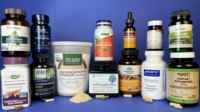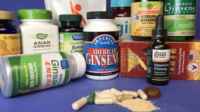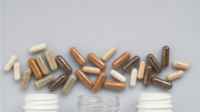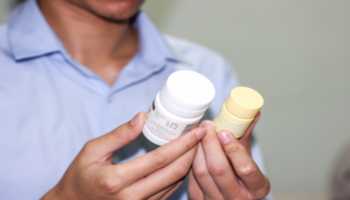
Answer:
Supplements promoted to increase energy, reduce stress and other symptoms caused by "adrenal fatigue" may contain a variety of ingredients, including vitamins and minerals, herbs, and/or dehydrated adrenal gland tissue from animals (typically from bovine source, i.e., cows). While some of these ingredients have individually been shown to reduce fatigue or symptoms of stress, there is currently little evidence that "adrenal support formulas" do the same or improve adrenal gland function. Additionally, an analysis of popular adrenal support supplements on the market found that all contained small amounts of thyroid and steroid hormones, which could potentially cause adverse effects or interfere with blood test results.
The adrenal glands secrete the "fight or flight" hormones adrenaline, cortisol (to increase blood sugar) and aldosterone (to increase blood pressure). "Adrenal fatigue" is the concept that in people who experience chronic emotional or physical stress, the adrenal glands can become overburdened and stop working efficiently—leading to symptoms such as difficulty waking in the morning, tiredness during the day, and salt and sugar cravings. However, while stress and fatigue can have very real effects on physical and emotional health, there is not enough evidence to prove that these effects are caused by improperly functioning adrenal glands (Cadegiani, BMC Endocr Disord 2016; Endocrine Society 2018). [Note: Adrenal fatigue should not be confused with adrenal insufficiency (Addison's disease), a rare but potentially life threatening endocrine disorder].
Herbal adrenal support formulas often contain a combination of herbs such as ashwagandha, ginseng, holy basil, rhodiola, and schisandra. There is preliminary evidence that some (but not all) of these herbs may help to reduce symptoms of stress or anxiety. For example, several small clinical studies suggest that ashwagandha can help to reduce anxiety and fatigue in people with mild to moderate anxiety. Holy basil may also help to reduce anxiety, and rhodiola may improve mood in people with depression, although research does not suggest it is helpful for anxiety or fatigue. However, there do not appear to be clinical studies on the effects of taking these herbs in combination, or their effects on adrenal gland function.
Adrenal support supplements can also contain freeze-dried adrenal glands or adrenal gland cortex (the outer layer of the adrenal gland) extract from cows. Once used to treat Addison's disease, adrenal gland extract was found to be low in potency and removed removed from the drug market in 1978 as synthetic medications became available (U.S. Government Accountability Office 1981). There were also safety concerns with injectable and imported adrenal gland extracts (Galil, Emerg Infect Dis 1999; FDA 2011). Adrenal gland extract is available as a dietary supplement ingredient; however, supplement labels do not list their potency or how much of each adrenal hormone they contain.
Concerningly, an analysis of the twelve most popular adrenal support supplements (six herbal, three bovine-derived, and three herbal-bovine combination formulas) sold on a well-known online shopping website found that all of the products contained small amounts of thyroid and steroid hormones (pregnenolone, budesonide, androstenedione, progesterone, cortisol and/or cortisone) that were not listed as ingredients on their labels. Six of the herbal formulas contained the thyroid hormone triiodothyronine (T3), as did all three of the bovine-derived products and all three herbal-bovine combination products (Akturk, Mayo Clin Proc 2018).
Pregnenolone is a hormone that is used in the body to make other hormones, such as testosterone and estrogen, and it is legally permitted as a dietary supplement ingredient. Only trace amounts of this hormone were found in the adrenal support supplements -- less than 0.0012 mg per daily recommended serving, compared to a typical 30 mg daily dose available from pregnenolone supplements. Small amounts (0.00000725 mg or less) of androstenedione, a hormone that is not legally permitted in dietary supplements, was found in two bovine-derived supplements. Amounts of T3 found in the products ranged from approximately 0. 06 mcg to 1.3 mcg, which is relatively small compared to a typical prescription dose of 25 mcg to 75 mcg. However, the researchers warned that exposure to these hormones "without health care provider oversight may be associated with serious adverse consequences," and that "consumption of these supplements may also alter clinical laboratory results, thereby leading to an additional unnecessary testing or even an incorrect diagnosis." (Akturk, Mayo Clin Proc 2018).
The bottom line:
There is little evidence that symptoms attributed to "adrenal fatigue," such as feeling stressed, tired, or having salt or sugar cravings, are caused by improperly functioning adrenal glands, or that combination formulas promoted for adrenal support improve these symptoms.
Certain herbs, like ashwagandha and rhodiola, found in "adrenal support" supplements may help reduce stress and fatigue, or improve mood. However, you are likely better off trying these as single-ingredient products rather than within "formulas" to be sure you are getting the proper quality and dose. Be aware that supplements promoted for adrenal support and adrenal fatigue may contain undeclared thyroid and steroid hormones that could cause adverse effects or interfere with blood test results.
Join today to unlock all member benefits including full access to all CL Answers and over 1,400 reviews.
Join NowAlready a member? Sign In Here.
Join now at www.consumerlab.com/join/











Submit your comment
This feature is restricted to active members.
Join now to add comments and get all member benefits, including over 1,400 reviews.
Join NowAlready a member? Sign in here.